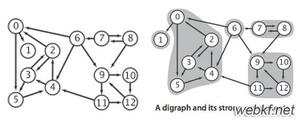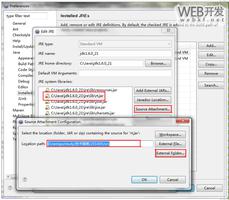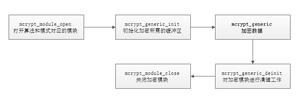基于C语言实现的aes256加密算法示例
本文实例讲述了基于C语言实现的aes256加密算法。分享给大家供大家参考,具体如下:
aes256.h:
#ifndef uint8_t
#define uint8_t unsigned char
#endif
#ifdef __cplusplus
extern "C" {
#endif
typedef struct {
uint8_t key[32];
uint8_t enckey[32];
uint8_t deckey[32];
} aes256_context;
void aes256_init(aes256_context *, uint8_t * );
void aes256_done(aes256_context *);
void aes256_encrypt_ecb(aes256_context *, uint8_t * );
void aes256_decrypt_ecb(aes256_context *, uint8_t * );
#ifdef __cplusplus
}
#endif
aes256.c:
#include "aes256.h"
#define F(x) (((x)<<1) ^ ((((x)>>7) & 1) * 0x1b))
#define FD(x) (((x) >> 1) ^ (((x) & 1) ? 0x8d : 0))
// #define BACK_TO_TABLES
#ifdef BACK_TO_TABLES
const uint8_t sbox[256] = {
0x63, 0x7c, 0x77, 0x7b, 0xf2, 0x6b, 0x6f, 0xc5,
0x30, 0x01, 0x67, 0x2b, 0xfe, 0xd7, 0xab, 0x76,
0xca, 0x82, 0xc9, 0x7d, 0xfa, 0x59, 0x47, 0xf0,
0xad, 0xd4, 0xa2, 0xaf, 0x9c, 0xa4, 0x72, 0xc0,
0xb7, 0xfd, 0x93, 0x26, 0x36, 0x3f, 0xf7, 0xcc,
0x34, 0xa5, 0xe5, 0xf1, 0x71, 0xd8, 0x31, 0x15,
0x04, 0xc7, 0x23, 0xc3, 0x18, 0x96, 0x05, 0x9a,
0x07, 0x12, 0x80, 0xe2, 0xeb, 0x27, 0xb2, 0x75,
0x09, 0x83, 0x2c, 0x1a, 0x1b, 0x6e, 0x5a, 0xa0,
0x52, 0x3b, 0xd6, 0xb3, 0x29, 0xe3, 0x2f, 0x84,
0x53, 0xd1, 0x00, 0xed, 0x20, 0xfc, 0xb1, 0x5b,
0x6a, 0xcb, 0xbe, 0x39, 0x4a, 0x4c, 0x58, 0xcf,
0xd0, 0xef, 0xaa, 0xfb, 0x43, 0x4d, 0x33, 0x85,
0x45, 0xf9, 0x02, 0x7f, 0x50, 0x3c, 0x9f, 0xa8,
0x51, 0xa3, 0x40, 0x8f, 0x92, 0x9d, 0x38, 0xf5,
0xbc, 0xb6, 0xda, 0x21, 0x10, 0xff, 0xf3, 0xd2,
0xcd, 0x0c, 0x13, 0xec, 0x5f, 0x97, 0x44, 0x17,
0xc4, 0xa7, 0x7e, 0x3d, 0x64, 0x5d, 0x19, 0x73,
0x60, 0x81, 0x4f, 0xdc, 0x22, 0x2a, 0x90, 0x88,
0x46, 0xee, 0xb8, 0x14, 0xde, 0x5e, 0x0b, 0xdb,
0xe0, 0x32, 0x3a, 0x0a, 0x49, 0x06, 0x24, 0x5c,
0xc2, 0xd3, 0xac, 0x62, 0x91, 0x95, 0xe4, 0x79,
0xe7, 0xc8, 0x37, 0x6d, 0x8d, 0xd5, 0x4e, 0xa9,
0x6c, 0x56, 0xf4, 0xea, 0x65, 0x7a, 0xae, 0x08,
0xba, 0x78, 0x25, 0x2e, 0x1c, 0xa6, 0xb4, 0xc6,
0xe8, 0xdd, 0x74, 0x1f, 0x4b, 0xbd, 0x8b, 0x8a,
0x70, 0x3e, 0xb5, 0x66, 0x48, 0x03, 0xf6, 0x0e,
0x61, 0x35, 0x57, 0xb9, 0x86, 0xc1, 0x1d, 0x9e,
0xe1, 0xf8, 0x98, 0x11, 0x69, 0xd9, 0x8e, 0x94,
0x9b, 0x1e, 0x87, 0xe9, 0xce, 0x55, 0x28, 0xdf,
0x8c, 0xa1, 0x89, 0x0d, 0xbf, 0xe6, 0x42, 0x68,
0x41, 0x99, 0x2d, 0x0f, 0xb0, 0x54, 0xbb, 0x16
};
const uint8_t sboxinv[256] = {
0x52, 0x09, 0x6a, 0xd5, 0x30, 0x36, 0xa5, 0x38,
0xbf, 0x40, 0xa3, 0x9e, 0x81, 0xf3, 0xd7, 0xfb,
0x7c, 0xe3, 0x39, 0x82, 0x9b, 0x2f, 0xff, 0x87,
0x34, 0x8e, 0x43, 0x44, 0xc4, 0xde, 0xe9, 0xcb,
0x54, 0x7b, 0x94, 0x32, 0xa6, 0xc2, 0x23, 0x3d,
0xee, 0x4c, 0x95, 0x0b, 0x42, 0xfa, 0xc3, 0x4e,
0x08, 0x2e, 0xa1, 0x66, 0x28, 0xd9, 0x24, 0xb2,
0x76, 0x5b, 0xa2, 0x49, 0x6d, 0x8b, 0xd1, 0x25,
0x72, 0xf8, 0xf6, 0x64, 0x86, 0x68, 0x98, 0x16,
0xd4, 0xa4, 0x5c, 0xcc, 0x5d, 0x65, 0xb6, 0x92,
0x6c, 0x70, 0x48, 0x50, 0xfd, 0xed, 0xb9, 0xda,
0x5e, 0x15, 0x46, 0x57, 0xa7, 0x8d, 0x9d, 0x84,
0x90, 0xd8, 0xab, 0x00, 0x8c, 0xbc, 0xd3, 0x0a,
0xf7, 0xe4, 0x58, 0x05, 0xb8, 0xb3, 0x45, 0x06,
0xd0, 0x2c, 0x1e, 0x8f, 0xca, 0x3f, 0x0f, 0x02,
0xc1, 0xaf, 0xbd, 0x03, 0x01, 0x13, 0x8a, 0x6b,
0x3a, 0x91, 0x11, 0x41, 0x4f, 0x67, 0xdc, 0xea,
0x97, 0xf2, 0xcf, 0xce, 0xf0, 0xb4, 0xe6, 0x73,
0x96, 0xac, 0x74, 0x22, 0xe7, 0xad, 0x35, 0x85,
0xe2, 0xf9, 0x37, 0xe8, 0x1c, 0x75, 0xdf, 0x6e,
0x47, 0xf1, 0x1a, 0x71, 0x1d, 0x29, 0xc5, 0x89,
0x6f, 0xb7, 0x62, 0x0e, 0xaa, 0x18, 0xbe, 0x1b,
0xfc, 0x56, 0x3e, 0x4b, 0xc6, 0xd2, 0x79, 0x20,
0x9a, 0xdb, 0xc0, 0xfe, 0x78, 0xcd, 0x5a, 0xf4,
0x1f, 0xdd, 0xa8, 0x33, 0x88, 0x07, 0xc7, 0x31,
0xb1, 0x12, 0x10, 0x59, 0x27, 0x80, 0xec, 0x5f,
0x60, 0x51, 0x7f, 0xa9, 0x19, 0xb5, 0x4a, 0x0d,
0x2d, 0xe5, 0x7a, 0x9f, 0x93, 0xc9, 0x9c, 0xef,
0xa0, 0xe0, 0x3b, 0x4d, 0xae, 0x2a, 0xf5, 0xb0,
0xc8, 0xeb, 0xbb, 0x3c, 0x83, 0x53, 0x99, 0x61,
0x17, 0x2b, 0x04, 0x7e, 0xba, 0x77, 0xd6, 0x26,
0xe1, 0x69, 0x14, 0x63, 0x55, 0x21, 0x0c, 0x7d
};
#define rj_sbox(x) sbox[(x)]
#define rj_sbox_inv(x) sboxinv[(x)]
#else
uint8_t gf_alog(uint8_t x) // calculate anti-logarithm gen 3
{
uint8_t atb = 1, z;
while (x--) {z = atb; atb <<= 1; if (z & 0x80) atb^= 0x1b; atb ^= z;}
return atb;
}
uint8_t gf_log(uint8_t x) // calculate logarithm gen 3
{
uint8_t atb = 1, i = 0, z;
do {
if (atb == x) break;
z = atb; atb <<= 1; if (z & 0x80) atb^= 0x1b; atb ^= z;
} while (++i > 0);
return i;
}
uint8_t gf_mulinv(uint8_t x) // calculate multiplicative inverse
{
return (x) ? gf_alog(255 - gf_log(x)) : 0;
}
uint8_t rj_sbox(uint8_t x)
{
uint8_t y, sb;
sb = y = gf_mulinv(x);
y = (y<<1)|(y>>7); sb ^= y; y = (y<<1)|(y>>7); sb ^= y;
y = (y<<1)|(y>>7); sb ^= y; y = (y<<1)|(y>>7); sb ^= y;
return (sb ^ 0x63);
}
uint8_t rj_sbox_inv(uint8_t x)
{
uint8_t y, sb;
y = x ^ 0x63;
sb = y = (y<<1)|(y>>7);
y = (y<<2)|(y>>6); sb ^= y; y = (y<<3)|(y>>5); sb ^= y;
return gf_mulinv(sb);
}
#endif
uint8_t rj_xtime(uint8_t x)
{
return (x & 0x80) ? ((x << 1) ^ 0x1b) : (x << 1);
}
void aes_subBytes(uint8_t *buf)
{
register uint8_t i = 16;
while (i--) buf[i] = rj_sbox(buf[i]);
}
void aes_subBytes_inv(uint8_t *buf)
{
register uint8_t i = 16;
while (i--) buf[i] = rj_sbox_inv(buf[i]);
}
void aes_addRoundKey(uint8_t *buf, uint8_t *key)
{
register uint8_t i = 16;
while (i--) buf[i] ^= key[i];
}
void aes_addRoundKey_cpy(uint8_t *buf, uint8_t *key, uint8_t *cpk)
{
register uint8_t i = 16;
while (i--) buf[i] ^= (cpk[i] = key[i]), cpk[16+i] = key[16 + i];
}
void aes_shiftRows(uint8_t *buf)
{
register uint8_t i, j;
i = buf[1]; buf[1] = buf[5]; buf[5] = buf[9]; buf[9] = buf[13]; buf[13] = i;
i = buf[10]; buf[10] = buf[2]; buf[2] = i;
j = buf[3]; buf[3] = buf[15]; buf[15] = buf[11]; buf[11] = buf[7]; buf[7] = j;
j = buf[14]; buf[14] = buf[6]; buf[6] = j;
}
void aes_shiftRows_inv(uint8_t *buf)
{
register uint8_t i, j;
i = buf[1]; buf[1] = buf[13]; buf[13] = buf[9]; buf[9] = buf[5]; buf[5] = i;
i = buf[2]; buf[2] = buf[10]; buf[10] = i;
j = buf[3]; buf[3] = buf[7]; buf[7] = buf[11]; buf[11] = buf[15]; buf[15] = j;
j = buf[6]; buf[6] = buf[14]; buf[14] = j;
}
void aes_mixColumns(uint8_t *buf)
{
register uint8_t i, a, b, c, d, e;
for (i = 0; i < 16; i += 4)
{
a = buf[i]; b = buf[i + 1]; c = buf[i + 2]; d = buf[i + 3];
e = a ^ b ^ c ^ d;
buf[i] ^= e ^ rj_xtime(a^b); buf[i+1] ^= e ^ rj_xtime(b^c);
buf[i+2] ^= e ^ rj_xtime(c^d); buf[i+3] ^= e ^ rj_xtime(d^a);
}
}
void aes_mixColumns_inv(uint8_t *buf)
{
register uint8_t i, a, b, c, d, e, x, y, z;
for (i = 0; i < 16; i += 4)
{
a = buf[i]; b = buf[i + 1]; c = buf[i + 2]; d = buf[i + 3];
e = a ^ b ^ c ^ d;
z = rj_xtime(e);
x = e ^ rj_xtime(rj_xtime(z^a^c)); y = e ^ rj_xtime(rj_xtime(z^b^d));
buf[i] ^= x ^ rj_xtime(a^b); buf[i+1] ^= y ^ rj_xtime(b^c);
buf[i+2] ^= x ^ rj_xtime(c^d); buf[i+3] ^= y ^ rj_xtime(d^a);
}
}
void aes_expandEncKey(uint8_t *k, uint8_t *rc)
{
register uint8_t i;
k[0] ^= rj_sbox(k[29]) ^ (*rc);
k[1] ^= rj_sbox(k[30]);
k[2] ^= rj_sbox(k[31]);
k[3] ^= rj_sbox(k[28]);
*rc = F( *rc);
for(i = 4; i < 16; i += 4) k[i] ^= k[i-4], k[i+1] ^= k[i-3],
k[i+2] ^= k[i-2], k[i+3] ^= k[i-1];
k[16] ^= rj_sbox(k[12]);
k[17] ^= rj_sbox(k[13]);
k[18] ^= rj_sbox(k[14]);
k[19] ^= rj_sbox(k[15]);
for(i = 20; i < 32; i += 4) k[i] ^= k[i-4], k[i+1] ^= k[i-3],
k[i+2] ^= k[i-2], k[i+3] ^= k[i-1];
}
void aes_expandDecKey(uint8_t *k, uint8_t *rc)
{
uint8_t i;
for(i = 28; i > 16; i -= 4) k[i+0] ^= k[i-4], k[i+1] ^= k[i-3],
k[i+2] ^= k[i-2], k[i+3] ^= k[i-1];
k[16] ^= rj_sbox(k[12]);
k[17] ^= rj_sbox(k[13]);
k[18] ^= rj_sbox(k[14]);
k[19] ^= rj_sbox(k[15]);
for(i = 12; i > 0; i -= 4) k[i+0] ^= k[i-4], k[i+1] ^= k[i-3],
k[i+2] ^= k[i-2], k[i+3] ^= k[i-1];
*rc = FD(*rc);
k[0] ^= rj_sbox(k[29]) ^ (*rc);
k[1] ^= rj_sbox(k[30]);
k[2] ^= rj_sbox(k[31]);
k[3] ^= rj_sbox(k[28]);
}
void aes256_init(aes256_context *ctx, uint8_t *k)
{
uint8_t rcon = 1;
register uint8_t i;
for (i = 0; i < sizeof(ctx->key); i++) ctx->enckey[i] = ctx->deckey[i] = k[i];
for (i = 8;--i;) aes_expandEncKey(ctx->deckey, &rcon);
}
void aes256_done(aes256_context *ctx)
{
register uint8_t i;
for (i = 0; i < sizeof(ctx->key); i++)
ctx->key[i] = ctx->enckey[i] = ctx->deckey[i] = 0;
}
void aes256_encrypt_ecb(aes256_context *ctx, uint8_t *buf)
{
uint8_t i, rcon;
aes_addRoundKey_cpy(buf, ctx->enckey, ctx->key);
for(i = 1, rcon = 1; i < 14; ++i)
{
aes_subBytes(buf);
aes_shiftRows(buf);
aes_mixColumns(buf);
if( i & 1 ) aes_addRoundKey( buf, &ctx->key[16]);
else aes_expandEncKey(ctx->key, &rcon), aes_addRoundKey(buf, ctx->key);
}
aes_subBytes(buf);
aes_shiftRows(buf);
aes_expandEncKey(ctx->key, &rcon);
aes_addRoundKey(buf, ctx->key);
}
void aes256_decrypt_ecb(aes256_context *ctx, uint8_t *buf)
{
uint8_t i, rcon;
aes_addRoundKey_cpy(buf, ctx->deckey, ctx->key);
aes_shiftRows_inv(buf);
aes_subBytes_inv(buf);
for (i = 14, rcon = 0x80; --i;)
{
if( ( i & 1 ) )
{
aes_expandDecKey(ctx->key, &rcon);
aes_addRoundKey(buf, &ctx->key[16]);
}
else aes_addRoundKey(buf, ctx->key);
aes_mixColumns_inv(buf);
aes_shiftRows_inv(buf);
aes_subBytes_inv(buf);
}
aes_addRoundKey( buf, ctx->key);
}
demo.c:
#include
#include
#include "aes256.h"
#define DUMP(s, i, buf, sz) {printf(s); /
for (i = 0; i < (sz);i++) /
printf("x ", buf[i]); /
printf("/n");}
int main (int argc, char *argv[])
{
aes256_context ctx;
uint8_t key[32];
uint8_t buf[16], i;
for (i = 0; i < sizeof(buf);i++) buf[i] = i * 16 + i;
for (i = 0; i < sizeof(key);i++) key[i] = i;
DUMP("txt: ", i, buf, sizeof(buf));
DUMP("key: ", i, key, sizeof(key));
printf("---/n");
aes256_init(&ctx, key);
aes256_encrypt_ecb(&ctx, buf);
DUMP("enc: ", i, buf, sizeof(buf));
printf("tst: 8e a2 b7 ca 51 67 45 bf ea fc 49 90 4b 49 60 89/n");
aes256_init(&ctx, key);
aes256_decrypt_ecb(&ctx, buf);
DUMP("dec: ", i, buf, sizeof(buf));
aes256_done(&ctx);
return 0;
}
PS:关于加密解密感兴趣的朋友还可以参考本站在线工具:
MD5在线加密工具:
http://tools.jb51.net/password/CreateMD5Password
迅雷、快车、旋风URL加密/解密工具:
http://tools.jb51.net/password/urlrethunder
在线散列/哈希算法加密工具:
http://tools.jb51.net/password/hash_encrypt
在线MD5/hash/SHA-1/SHA-2/SHA-256/SHA-512/SHA-3/RIPEMD-160加密工具:
http://tools.jb51.net/password/hash_md5_sha
在线sha1/sha224/sha256/sha384/sha512加密工具:
http://tools.jb51.net/password/sha_encode
希望本文所述对大家C语言程序设计有所帮助。
以上是 基于C语言实现的aes256加密算法示例 的全部内容, 来源链接: utcz.com/z/314141.html







